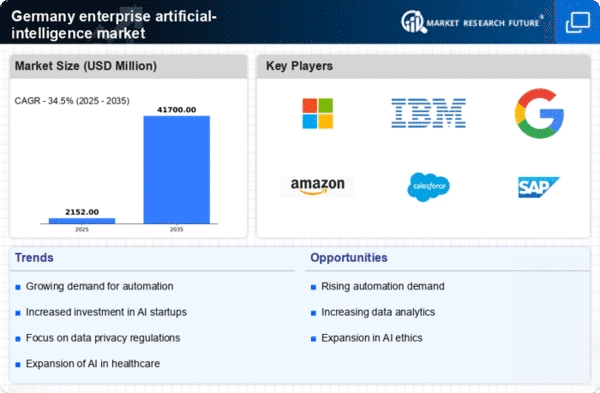Increased Cybersecurity Concerns
As the enterprise artificial-intelligence market evolves, heightened cybersecurity concerns emerge as a critical driver. With the growing reliance on AI technologies, organizations in Germany face increased risks related to data breaches and cyberattacks. In 2025, it is anticipated that investments in AI-driven cybersecurity solutions will rise by 30%, as companies seek to protect sensitive information and maintain customer trust. This trend underscores the importance of integrating robust security measures within AI systems. As businesses prioritize cybersecurity, the demand for AI solutions that can proactively identify and mitigate threats is likely to grow, shaping the future landscape of the enterprise artificial-intelligence market.
Regulatory Support for AI Development
the enterprise artificial-intelligence market benefited from regulatory support aimed at fostering AI development in Germany. The government has implemented various initiatives to promote research and innovation in AI technologies, which is expected to stimulate market growth. By 2025, public funding for AI projects is projected to reach €1 billion, reflecting the commitment to establishing Germany as a leader in AI innovation. This supportive regulatory environment encourages collaboration between private enterprises and research institutions, facilitating the development of cutting-edge AI solutions. As a result, businesses are more likely to invest in AI technologies, knowing that they have the backing of governmental policies and funding.
Rising Demand for Automation Solutions
the enterprise artificial-intelligence market in Germany experienced a notable surge in demand for automation solutions across various sectors. Companies are increasingly adopting AI technologies to streamline operations, enhance productivity, and reduce operational costs. In 2025, it is estimated that the automation segment will account for approximately 35% of the total market share. This trend is driven by the need for efficiency and the ability to process large volumes of data quickly. As organizations seek to remain competitive, the integration of AI-driven automation tools becomes essential. Furthermore, the push towards Industry 4.0 initiatives in Germany further accelerates this demand, as businesses aim to leverage AI to optimize manufacturing processes and supply chain management.
Advancements in Natural Language Processing
The enterprise artificial-intelligence market in Germany is significantly influenced by advancements in natural language processing (NLP) technologies. These innovations enable machines to understand and interpret human language, facilitating improved communication between businesses and their customers. By 2025, the NLP segment is expected to grow by approximately 25%, driven by the increasing adoption of chatbots and virtual assistants in customer service applications. This trend reflects a broader movement towards enhancing user experience and operational efficiency. As organizations leverage NLP capabilities, they can automate customer interactions, reduce response times, and ultimately improve customer satisfaction, which is crucial in a competitive market landscape.
Growing Focus on Data-Driven Decision Making
In the enterprise artificial-intelligence market, there is an increasing emphasis on data-driven decision making among German businesses. Organizations recognize the value of harnessing AI to analyze vast datasets, enabling them to derive actionable insights and make informed strategic choices. By 2025, it is projected that around 60% of enterprises will utilize AI analytics tools to enhance their decision-making processes. This shift towards data-centric approaches is likely to foster innovation and improve operational efficiency. As companies invest in AI technologies, they are better equipped to respond to market changes and customer preferences, thereby gaining a competitive edge in their respective industries.
















